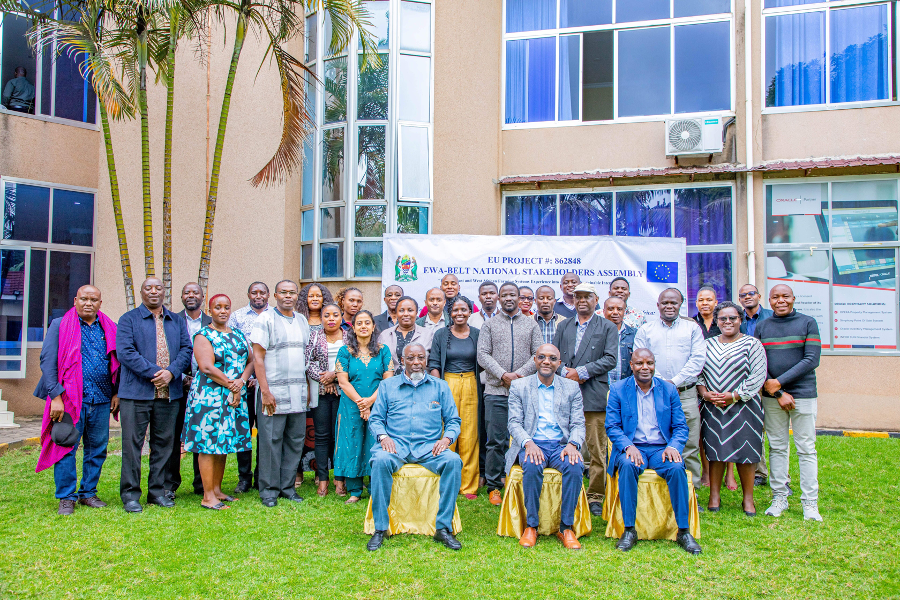EWA-BELT Final Conference: “Towards an Agroecological transition through Sustainable intensification in Sub-Saharan Africa: Lessons learned and Research Evidence”
- OCCAM - Observatory on Digital Communication

- Jul 16, 2025
- 2 min read
Updated: Aug 18, 2025
15-16-17 July, 2025 – African Union HQ, Addis Ababa (Ethiopia)

The African Union HQ, hosts the Final Conference of the EWA-BELT Project: five years of research for Sustainable Intensification (SI) of agricultural systems in Sub-Saharan Africa, funded by the European Union under the Horizon 2020 programme and coordinated by the Desertification Research Unit of the University of Sassari.
The project, established in 2020, has operated for five years in rural areas of East Africa (Ethiopia, Tanzania, Kenya) and West Africa (Ghana, Burkina Faso and Sierra Leone) with a participatory approach that involved European and African researchers, as well as farmers and local institutions. The aim was to promote accessible practices for small farmers by testing innovative solutions for sustainable soil and water management along with pathogen control.
Within the main fields of intervention are included, the exploitation of neglected and Underutilized Crop Species (NUS), the adoption of integrated control measures (biopesticides, aflatoxin control, post-harvest techniques) the introduction of digital tools for remote diagnosis and monitoring of crop diseases, such as the PlantHead Platform.
The conference, entitled "Towards an agroecological transition in sub-Saharan Africa: scientific evidence and lessons learned", brought together researchers, political decision-makers, and institutional representatives of international organisations to reflect on the project’s impact and outline future perspectives.
"In these five years, we have built much more than a project; we have created solid relationships between scientific communities, farmers, institutions and fields» - has affirmed Professor Giovanna Seddaiu, EWA-BELT Project Coordinator.
«EWA-BELT has demonstrated that agriculture can be a driver of resilience and development if driven by shared knowledge, mutual listening and responsible innovation. Now, the challenge is to ensure that the results obtained do not remain only a pilot experiment, but they will become a common heritage and a catalyst for change for the agricultural policies in Africa and beyond.
Following this objective, the group of the Research Nucleus on Desertification of the University of Sassari is ready to do its part, continuing the daily work of research, development of new projects, building upon international relations».
In the first two days, participants shared the results and good practices emerged, enriched by interventions of important speakers, such as Carlo Fadda, Director of Bioversity International and CIAT; Professor Adeyemu Aremu, expert of indigenous knowledge at the North-West University in South Africa, but also of researchers from the University of Sassari, such as Doctor Antonio Pulina and Doctor Meron Tefera.
The third day will be dedicated to a strategic panel, organized in collaboration with SAFGRAD (African Union), to discuss the conditions and policies necessary for the spread of sustainable intensification in African agricultural systems. Participants include high-level representatives from FAO, the European Commission (DG AGRI), the African Union and major African and international research centres.
The EWA-BELT project concludes with a clear legacy: building resilient, inclusive and sustainable food systems by harnessing local knowledge and participatory innovation.
Follow us on social media to stay up to date!
EWA-BELT Project |
Website: www.ewabelt.eu Facebook: ewabelt.project Instagram: ewabelt_project X: ewabelt_project LinkedIn: showcase/ewa-belt YouTube: occam3039 Joint YouTube channel: @sfs35 |
For media inquiries, please contact:
OCCAM - Observatory on Digital Communication





Comments